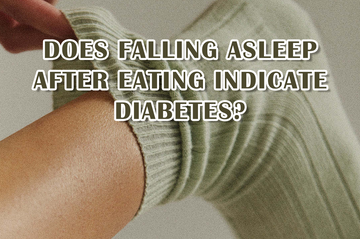Falling asleep after eating is not necessarily a sign of diabetes, but it can be related to how your body processes food and manages blood sugar levels. For some people, post-meal sleepiness is a normal response to digestion, while for others, it could indicate underlying health issues, including diabetes or prediabetes. Here’s what you need to know about this connection.
1. Why You May Feel Sleepy After Eating
Natural Digestive Response
- After eating, your body directs blood flow to the digestive system to help process food. This can sometimes leave you feeling less energetic.
- Meals high in carbohydrates can cause a rapid increase in blood sugar, followed by a drop, which may trigger fatigue.
Hormonal Changes
- Eating stimulates the release of hormones such as insulin, serotonin, and melatonin.
- High-carb meals increase serotonin production, which can lead to drowsiness.
Large Meals
- Overeating can strain the digestive system and lead to a temporary drop in energy levels.
2. Post-Meal Sleepiness and Diabetes
While occasional sleepiness after eating is normal, consistent or extreme drowsiness might be linked to diabetes or prediabetes. Here’s how:
Blood Sugar Spikes and Crashes
- In diabetes, the body’s ability to regulate blood sugar is impaired.
- After a meal, blood sugar may spike (hyperglycemia) and then drop rapidly (hypoglycemia), leading to fatigue.
Insulin Resistance
- In prediabetes or type 2 diabetes, cells resist insulin, making it harder for the body to use sugar from food effectively. This can result in fluctuating energy levels.
Neuropathy or Metabolic Stress
- Long-term high blood sugar can damage nerves and organs, leading to fatigue after eating.
3. Other Possible Causes
Post-meal drowsiness could also stem from other factors, such as:
- Sleep Apnea: Common in people with diabetes, sleep apnea can lead to chronic fatigue.
- Poor Diet: Eating meals high in refined carbs or sugar can cause unstable energy levels.
- Medical Conditions: Conditions like hypothyroidism or anemia can cause fatigue after eating.
4. When to Be Concerned
Falling asleep after eating warrants attention if accompanied by:
- Frequent thirst and urination.
- Unexplained weight loss.
- Blurred vision or dizziness.
- Slow healing of wounds.
- Tingling or numbness in hands or feet.
These are potential symptoms of diabetes and should prompt a visit to your healthcare provider.
5. How to Manage Post-Meal Fatigue
To reduce post-meal sleepiness:
- Balance Meals: Include a mix of protein, healthy fats, and complex carbs to stabilize blood sugar.
- Avoid Overeating: Stick to moderate portion sizes.
- Stay Active: Light activity after meals, such as walking, can improve blood sugar regulation.
- Monitor Symptoms: Track when fatigue occurs and discuss patterns with your doctor.
6. Diagnostic Steps
If you suspect diabetes, your doctor may recommend:
- Blood Glucose Tests: To check fasting glucose levels or response after a meal.
- HbA1c Test: Measures average blood sugar levels over 2-3 months.
- Glucose Tolerance Test: Assesses how your body handles sugar intake.
Conclusion
While falling asleep after eating doesn’t always indicate diabetes, persistent or extreme post-meal fatigue could be a warning sign of underlying health conditions. If you’re experiencing other symptoms of diabetes, or if post-meal drowsiness interferes with your daily life, consult a healthcare provider for proper evaluation and guidance.
